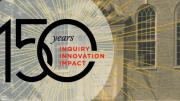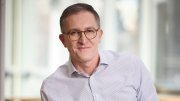It started 150 years ago, with the idea that perhaps Harvard should offer a graduate program. Initially, the College faculty balked: wouldn’t a graduate school siphon funding and attention from undergraduates? Not according to President Charles William Eliot. “It will strengthen the College,” he said, and in 1872—early in his transformative, 40-year tenure—he established what was then known as the graduate department. The first year, it enrolled 28 students. Now, 150 years later, that tiny department has evolved into the Harvard Graduate School of Arts and Sciences (GSAS), housing 57 programs of study and educating nearly 5,000 students.
The anniversary—celebrated throughout this academic year with global events and a website launched this week—is an opportunity for GSAS to reflect on its impact on Harvard and the world, says Dean Emma Dench. GSAS is the only school at Harvard where students pursue get Ph.D. degree. A Ph.D. candidate might complete her courses and research at the Harvard Kennedy School, for instance, but GSAS is still the institution through which she’s granted her Ph.D. in programs formally approved by both units. As such, Dench says GSAS is a leading “research engine” at the University. “We’re a place where the whole University intersects, and throughout our history, we’ve been developing and fostering this interconnectedness in real time,” she says. “We’re very proud to embody this cross-school perspective within Harvard.”
“History doesn’t repeat itself; it rhymes,” she continues, referencing a Seamus Heaney poem. “A lot of themes in our history rhymed for me.” Part of anniversary planning involved probing GSAS archives to learn more about the school’s past, unearthing common themes: intellectual rigor, diversity, and research with a broader impact.
In the nineteenth century, German research universities were the gold standard for scholarship—giving people the specialized training needed for a modernizing, industrializing world—while the United States lagged. Universities like Johns Hopkins had been founded on the German model, and Eliot established the graduate department to bring that spirit of a research university to Harvard. Rather than merely a place where the American elite finished their gentlemanly education, Eliot wanted Harvard to be a place where researchers created knowledge.
There was a bit of “snobbery” about Ph.D.s at the time, says Dench, both in America and abroad. Some viewed the years spent researching and specializing in a topic as a frivolous rich man’s hobby. “But somewhere like Harvard sets itself against that [notion] from quite an early date,” she notes, “saying actually, you can train people, you should train people, and we should have more trained people.”
Throughout its history, GSAS has served as an incubator for some of the world’s top leaders including Nobel Laureate John Franklin Ender, Ph.D. ’30, dubbed the “Father of Modern Vaccines” for developing the measles vaccine; Ralph Bunche, Ph.D. ’34, architect of the United Nations and the first person of color to receive the Nobel Peace Prize; Jennifer Doudna, Ph.D. ’89, who pioneered CRISPR gene editing; and countless others, including 56 Nobel Laureates. Even T.S. Eliot ’10, A.M. ’11, Litt.D. ’47, wrote “The Love Song of J. Alfred Prufrock” while at Harvard, where he submitted a doctoral dissertation on the philosophy of F.H. Bradley. Dench says, “Our history is a whole treasure box.”
Alongside the treasure, “We wanted to talk about our school’s history, warts and all,” says Jen Flynn, senior director of global outreach, who is spearheading the anniversary celebration. Looking back at the past 150 years means confronting the school’s—and the University’s—exclusionary past. It involves juggling two truths at once. For instance, Dench says President Eliot had “quite a vision for the graduate school and really wanted to foster intellectual diversity,” but at the same time, he supported eugenics, “racial science,” and segregation—as did many prominent faculty members who supervised Ph.D. students. In 1895 (also during Eliot’s presidency) W.E.B. Du Bois became the first black American to receive a Ph.D. from Harvard, but the school was not a welcoming place. He later wrote, “I went to Harvard as a Negro…recognizing myself as a member of a segregated caste whose situation I accepted.” Women could pursue graduate studies at Harvard Annex (later Radcliffe College) in 1890, but they could not enroll at GSAS until 1962. Dench says, “We had to think very, very deeply about both our legacy and how we want to make this the most welcoming place for graduate students.”
Fostering inclusion is one of Dench’s main goals as dean now. Some of her work has focused on diversifying the student body: “We look across the world and in every corner of the U.S. to recruit our students.” She adds, “We’re continuing to work on the conditions that will allow them to thrive, so that we foster talent—never waste it.” Right now, GSAS is a pilot of Faculty of Arts and Sciences Dean Claudine Gay’s Visual Culture and Signage project and is revamping its student center design to be as inviting as possible. Says Dench, “It’s this sort of work that helps us think, in a very material way, about how we welcome our students and how they want to be welcomed.”
Financial aid played a large role in GSAS’s past, and Dench says it will play a large role in its future. Looking back at GSAS’s history (it took 90 years for the school to offer full financial aid) reinforced for her the value of institutional support for students. GSAS now offers guaranteed funding for the first five years of Ph.D. programs. “It’s really expensive to provide this support and it’s really worth it,” she says. At a time when doctoral programs’ graduates are find traditional academic career paths increasingly scarce and fraught, GSAS is looking hard at how many students it admits in each cohort, how it mentors them, how it is organized to provide for their education and intellectual development, and the path they take after Harvard. “What we’re trying to do—and I think we largely do do—is to free these brilliant students up so they can really focus on their training, research, and professional development.”
Dench hopes that during GSAS’s next 150 years, the school will continue its current trajectory: “We’re nourishing the world with, not just academia, but with what I call ‘intellectual leadership.’” Fifty percent of GSAS graduates go into careers outside of academia, and increasingly, students are leaning into the cross-University purview of GSAS and delving into interdisciplinary fields like quantum science. “I think we’ve got a whole lot more to give as we continue to realize the gold we have here,” the dean says. “I’m very excited about GSAS’s future—long, long after all of us are gone.”
Anniversary events begin November 15 in New York City with a conversation about truth and fake news, between New York Times executive editor Joe Kahn ’87, A.M. ’90, and Conant University Professor Danielle Allen. GSAS has spent more than a year planning an archival exhibit about its history and alumni for late March in Pusey Library. More events will be announced throughout the year.








